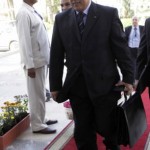 CAIRO: As Ethiopia’s Renaissance Dam continues to stir concern among Egyptians, many experts say the government should take steps to reach a compromise with Ethiopia, while others blame what they describe as Ethiopia’s obstinacy for the failure of negotiations.
CAIRO: As Ethiopia’s Renaissance Dam continues to stir concern among Egyptians, many experts say the government should take steps to reach a compromise with Ethiopia, while others blame what they describe as Ethiopia’s obstinacy for the failure of negotiations.
Water expert Diaa Al-Din Al-Quosi, an official in Egypt’s Ministry of Irrigation, told The Cairo Post on Wednesday that Egypt will lose over 20 percent of its share of Nile water, and over 30 percent of the electricity generated by the High Dam.
Quosi added that the construction of the dam violates Egypt’s historic rights to the Nile water, stipulated in a 1929 agreement.
The 1929 agreement was signed between the Egyptian government and its British counterpart, representing the colonial power, on behalf of Uganda, Tanzania and Kenya. According to this agreement, Egypt held the veto right over all upstream projects. The Ethiopian side refused to sign the treaty, as it was signed during the colonial era. Ethiopia said the British government did not represent the will of the Ethiopian people.
Quosi criticized what he describes as the stubborn attitude adopted by the Ethiopian government during negotiations, calling on the Ethiopian government to adopt a flexible position to pave the way for striking a compromise.
Ethiopia should turn to implement the proposal adopted by the U.S. Bureau of Reclamation in 1964 to build a lower dam on the Blue Nile to generate electricity, said Quosi.
Recent statements made by Ethiopia’s Minister of Irrigation Alemayehu Tegenu raised skepticism during a recent interview with the Ethiopian newspaper “The Reporter.” When speaking about Egypt’s position on the matter, Tegenu said “such [an] approach came to restore the use of force as an alternative.”
Tegenu stressed that Egypt’s campaign will not prevent Ethiopia from building the dam, describing Egypt’s efforts in this regard as cheap propaganda.
Amany al-Taweel, a strategic expert of Al-Ahram Center for Political and Strategic Studies, refused the Ethiopian official’s statements. Taweel said that such statements reflect Ethiopia’s tension due to the success of Egypt’s diplomatic efforts to convince the world that Ethiopia’s project has other strategic goals.
Taweel told The Cairo Post on Wednesday that the “Ethiopian side has not revealed the safety factor of the project. The Ethiopian dam could strongly affect Egypt’s water needs.”
She also said the African Union should perform its role and try to bridge the gap of difference to keep a balance of interests between the two countries.
African affairs expert Hany Raslan described the statements of the Ethiopian minister as lies, saying that “negotiations with Ethiopia reached a dead end.” He said that Ethiopia started the construction of the dam without conducting the necessary studies.
Regarding the Sudanese position on the issue, Raslan told The Cairo Post that there is a state of division among Sudanese experts over the benefits of the project for their country. He said that Sudan adopts a political situation that aims to protect the ruling regime of President Omar Hassan Al-Bashir.
Raslan underlined the increasing influence of the Ethiopian government in the internal conflicts witnessed in Sudan, saying that this influence is the main reason for the radical change witnessed in the Sudanese position from the issue.







![Water Wars: Egyptians Condemn Ethiopia’s Nile Dam Project [National Geographic]](https://www.ethiopianopinion.com/wp-content/uploads/2013/09/renaissance-150x150.jpg)












![Police in Addis Ababa arrested Ethiopian woman for wearing fake butt pads [Satire] Police in Addis Ababa arrested Ethiopian woman for wearing fake butt pads [Satire]](https://www.ethiopianopinion.com/wp-content/plugins/top-10/timthumb/timthumb.php?src=http%3A%2F%2Fwww.ethiopianopinion.com%2Fwp-content%2Fuploads%2F2014%2F04%2FUnknown-150x150.jpg&w=&h=&zc=1&q=75)







Join Conversations